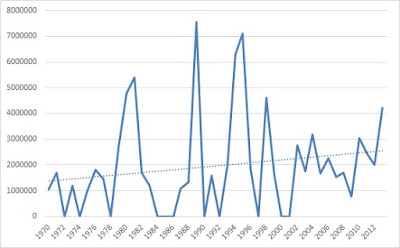Summer is my favorite time of year in the Gallatin valley, perhaps because it is so fleeting (which makes it ever-so precious). I hike, bike, and run about town in the wonderful sunlight, surrounded by blue skies and hot, dry heat. Of course, this weekend, my beloved Bozeman has been choked with smoke from a wildfire out in Three Forks. One of the costs of living in Montana, and the West more generally, is the fire season which is so essential to life and renewal here. Of course, that fire season has been getting worse and longer, which makes it harder on me when I exercise outside due to my asthma, a condition I've learned to manage throughout my life.
Over the weekend, I had time to reflect on forest fires and how sound public policy might help bring them under some control. I revisited Senator Daines’ recent op-ed in the Billings Gazette discussing wildfire and forest reform, which I read with interest. First, Daines hits the nail on the head concerning a critical challenge facing the US Forest Service and other federal agencies responsible for managing healthy forests: money. The US Forest Service’s budget is burdened with ever-increasing fire-fighting costs, which drain its ability to spend on other important activities such as trail, campground, and facility maintenance. Daines’ solution to this problem is his Wildfire Disaster Funding Act “which ensures large forest fires are treated and funded as the true natural disasters they are, similar to hurricanes or tornadoes.” I hope the bill—which Daines is co-sponsoring along with Senator Tester—finds a solid reception among critical allies of both parties, particularly those senators representing East Coast states hard hit by Hurricane Sandy. (Montanans also should hope that they don’t hold then-Congressman Steve Daines’ very first roll calls against him, given that he voted against a bill funding Sandy relief efforts.)
But what troubled me profoundly was the blame the senator placed
for the “deteriorating conditions” that are responsible for increased wildfire
risk. Senator Daines notes that we are at risk due to beetle kill in our
forests “being left untreated”—a risk that he says is compounded by “years of
inadequate forest management practices, spurred by obstructionist litigation
from fringe groups and excessive regulations.”
Really? Well, I guess it’s time for me to whip out some
“fancy” social science and give a little lesson in the funnel of causality. This
is a theory developed by Campbell et al in their path-breaking work The American Voter, published in 1960.
Essentially, Campbell et al argue that while the proximate decision influencing
how someone votes is a person’s issue position, those issue positions are the
product of a person’s party identification, which itself (often?) is a function
of how the person was socialized into politics by his or her parents.
In other words, there’s a causal chain one needs to follow
to understand the best and most powerful predictor of voting behavior, and that
predictor is partisan identification—a bundle of attitudes and beliefs that is
not immediately proximate to the voting decision. Issue positions don’t really
matter—it’s the partisanship behind those positions that do.
Now let’s apply the funnel of causality to Daines’ argument
on wildfires: According to his op-ed piece, the proximate causes for the risk
we face, which are the tired trope of “government mismanagement” and “fringe
environmentalists,” are the real problem Montanans face and the ones that
require attention and redress.
But one must ask: Why is there more beetle kill in the first
place? And why has the size
of wildfires been on the rise in the United States, Canada, and
globally—both as the charts below indicate and a recent
study demonstrated? Oh, right: Because the warmer winters associated with global
warming mean fewer Pine Bark beetles are dying off, enabling them to leave behind
more dead trees strewn about waiting to burn up. All of this is well-documented
Andrew Nikiforuk’s Empire of the Beetle. And, again, a recent study demonstrates that increasing temperatures lead to more wildfire
activity globally.
 |
| Total Hectares Burned by Wildfires in Canada, 1970-2013. Source: Canadian National Forestry Database |
 |
| Total Acres Burned in the US (in millions of Acres), 1960-2014. Source: CRS Report, "Federal Funding for Wildfire Control and Management," July 5, 2011 and National Interagency Fire Center. |
Daines is giving far too much credit to proximate
causes: lawsuits and mismanagement. The root problem
is global warming. We need to address that if we really want to get a handle on
our wildfire risk. And to address that we, as global citizens, need to come to
grips with our role in global warming via our insatiable appetite for carbon
emissions.
Unfortunately, Senator Daines voted against an amendment
earlier this year during the Keystone XL debate acknowledging the human role in
climate change and, when running for the House, indicated in an interview a few years ago that
the “jury
is still out” on the role of CO-2 emissions in our ever-warming world.
The jury is not out. Ninety-seven percent of studies unambiguously endorse the notion that rising carbon dioxide levels, the result of human activity, are an important and substantial contributor to global warming. Check out the information yourself at NASA.
How many of you, when running a business or a household,
place your bets on the 3 percent versus the 97 percent? If Senator Daines did
this during his business career, I assure you, his career would have been much
shorter and far less successful than it was. If I said it is only a "theory" that how people vote is a product largely of their partisanship, I'd be drummed out of the profession with good cause. The problem is that it is very hard for people to accept information that conflicts with their priors. Humans don't like cognitive dissonance, so instead, we reject information when it doesn't fit our beliefs. Worse, we search for justifications to confirm why that information is wrong and why what we believe is right. It is hard to overcome cognitive dissonance, but we--and those whom we elect to serve us--must.
The senator is a bright, articulate public servant. He is a
graduate of Montana State, and has a degree in engineering. One would think
that he would, as a man of science, make public policy on science and not
advanced smoke-and-mirrors arguments about a very real threat our forests face
from wildfire. How we fund fire fighting absolutely must change: Daines is
right on that. But if we are really going to make our forests safer today and
for future generations, we need to stop blaming red herrings and, instead, face
the facts staring us straight in the face with regards to climate change.
